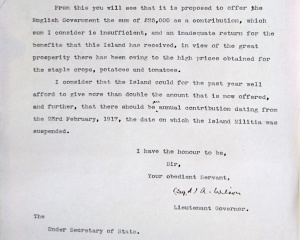The war had an inevitable impact on the island's economy. The States faced the extra costs of maintaining the Militia until it was disbanded and replaced by a Regular Army unit; and then came demands for payments to the UK Government to help finance the costs of the war.
Farmers prospered
But Jersey's farmers prospered as prices obtained for the principal crop – early potatoes – soared on UK markets.
The war was only a few weeks old when in November 1914 the States learned that the raising of a war loan had been endorsed by the British Treasury through the Privy Council. The cost of island defence was running at more than £1,000 a week and there was no provision for this in the current budget.
It was optimistically hoped that the loan of £50,000 from local banks would be sufficient to see the island through the war. By February 1915 the Militia costs had risen to closer to £2,000 a week – an annual cost of morethan £80,000, compared with the £6,500 annual cost in peacetime, which was enshrined in legislation.
The British Government turned down a plea to help with these expenses and the States Finance Committee was forced to issue another war bond to raise an additional £100,000, and to raise harbour dues and the duty paid on tea.
Militia costs continued to rise as the war showed no sign of ending and the decision to disband the unit in 1917 and replace it with the Royal Jersey Garrison Battalion, a unit of the British Army, brought temporary relief to the States because the British Government met its costs.
But only temporary relief, because the Government began to put pressure on the States to make a contribution towards the costs of the war and to fund at least part of the costs of defending the island. The situation was not helped by the revelation that potato exports during 1917 were worth over £800,00, a 41 per cent increase on 1916, which was also a record year. While farmers were complaining that they were struggling and could not afford for their sons to be sent to war, town dwellers had no chance of escaping conscription.
Gift offered
The further disclosure that the potato growers' fixed price contract to supply the British Army was proving very attractive when averaged over the whole season did nothing to help the farmers' cause. And it did nothing to ease the pressure on the States to contribute towards war costs. Although the 'gift' of £25,000 eventually offered at the end of 1917 was accepted with thanks, it did not impress the Lieut-Governor, who believed that the island could afford to pay more and that this was to be viewed as just an initial payment.
At the same time he announced that he would attempt to control the amount growers were receiving for potato exports and encouraged them to leave their crop in the ground longer to produce larger potatoes. The States Agriculture Committee told him that his plan would not work because the crop would rot in the ground.
By April 1918 pressure from the Home Office for Jersey to supply more men to join the forces; grow more food to help feed them and increase their financial contribution to the war effort was being reinforced by the Lieut-Governor.
The issue remained unresolved at the time. Although the Bailiff agreed to convene a States meeting to consider what could be done, the general consensus was that the war was leaving the island with substantial debts through the loans already raised to stop it becoming insolvent.

